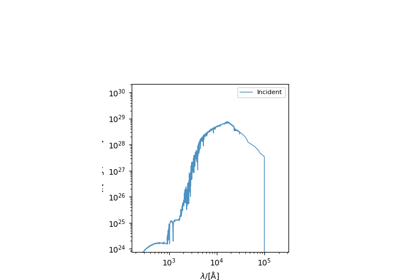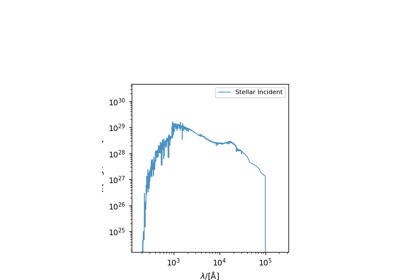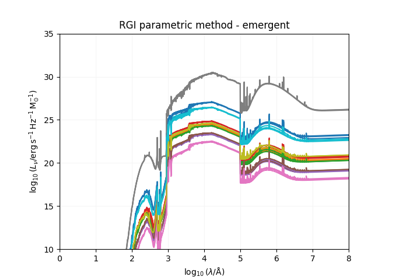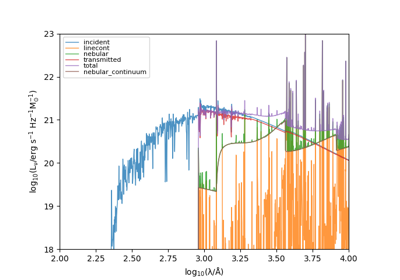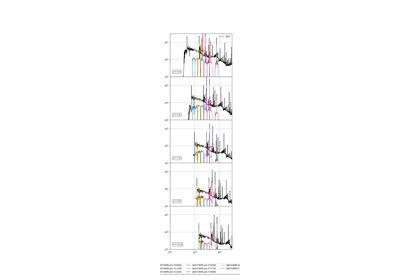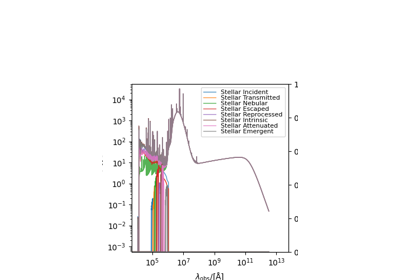synthesizer.emission_models.stellar.pacman_model¶
A module defining the Pacman emission models.
This module defines the PacmanEmission and BimodalPacmanEmission classes which are used to define the emission models for the Pacman model. Both these models combine various differen spectra together to produce a final total emission spectrum.
The PacmanEmission model is used to define the emission model for a single population of stars. Including both intrinsic and attenuate emission, and if a dust emission model is given also dust emission. It includes the option to include escaped emission for a given escape fraction, and if a lyman alpha escape fraction is given, a more sophisticated nebular emission model is used, including line and nebuluar continuum emission.
The BimodalPacmanEmission model is similar to the PacmanEmission model but splits the emission into a young and old population.
The Charlot & Fall (2000) model if a special of the BimodalPacmanEmission model and is also included. This model is identical to the BimodalPacmanEmission model but with a fixed age pivot of 10^7 Myr and no escaped emission.
Example:
To create a PacmanEmission model for a grid with a V-band optical depth of
0.1 and a dust curve, one would do the following:
dust_curve = PowerLaw(...)
model = PacmanEmission(grid, 0.1, dust_curve)
To create a CharlotFall2000 model, you can use the following code:
tau_v_ism = 0.5
tau_v_birth = 0.5
dust_curve_ism = PowerLaw(...)
dust_curve_birth = PowerLaw(...)
age_pivot = 7 * dimensionless
dust_emission_ism = BlackBody(...)
dust_emission_birth = GreyBody(...)
model = CharlotFall2000(
grid,
tau_v_ism,
tau_v_birth,
dust_curve_ism,
dust_curve_birth,
age_pivot,
dust_emission_ism,
dust_emission_birth,
)
Classes
- class synthesizer.emission_models.stellar.pacman_model.BimodalPacmanEmission(grid, tau_v_ism, tau_v_birth, dust_curve_ism, dust_curve_birth, age_pivot=unyt_quantity(7, 'dimensionless'), dust_emission_ism=None, dust_emission_birth=None, fesc=0.0, fesc_ly_alpha=1.0, label=None, stellar_dust=True, **kwargs)[source]¶
A class defining the Pacman model split into young and old populations.
This model defines both intrinsic and attenuated steller emission with or without dust emission. It also includes the option to include escaped emission for a given escape fraction. If a lyman alpha escape fraction is given, a more sophisticated nebular emission model is used, including line and nebuluar continuum emission.
All spectra produced have a young, old and combined component. The split between young and old is by default 10^7 Myr but can be changed with the age_pivot argument.
- This model will always produce:
- young_incident: the stellar emission incident onto the ISM for the
young population.
- old_incident: the stellar emission incident onto the ISM for the old
population.
- incident: the stellar emission incident onto the ISM for the
combined population.
young_intrinsic: the intrinsic emission for the young population.
old_intrinsic: the intrinsic emission for the old population.
intrinsic: the intrinsic emission for the combined population.
- young_attenuated_nebular: the nebular emission attenuated by dust
for the young population.
- young_attenuated_ism: the intrinsic emission attenuated by dust for
the young population.
- young_attenuated: the intrinsic emission attenuated by dust for the
young population.
- old_attenuated: the intrinsic emission attenuated by dust for the old
population.
- if grid.reprocessed is True:
- young_transmitted: the stellar emission transmitted through the ISM
for the young population.
- old_transmitted: the stellar emission transmitted through the ISM for
the old population.
- transmitted: the stellar emission transmitted through the ISM for the
combined population.
- young_nebular: the stellar emisison from nebulae for the young
population.
- old_nebular: the stellar emisison from nebulae for the old
population.
- nebular: the stellar emisison from nebulae for the combined
population.
- young_reprocessed: the stellar emission reprocessed by the ISM for
the young population.
- old_reprocessed: the stellar emission reprocessed by the ISM for the
old population.
- reprocessed: the stellar emission reprocessed by the ISM for the
combined population.
- if fesc > 0.0:
- young_escaped: the incident emission that completely escapes the ISM
for the young population.
- old_escaped: the incident emission that completely escapes the ISM
for the old population.
- escaped: the incident emission that completely escapes the ISM for
the combined population.
- young_emergent: the emission which emerges from the stellar
population, including any escaped emission for the young population.
- old_emergent: the emission which emerges from the stellar population,
including any escaped emission for the old population.
- emergent: the emission which emerges from the stellar population,
including any escaped emission for the combined population.
- if dust_emission is not None:
- young_dust_emission_birth: the emission from dust for the young
population.
- young_dust_emission_ism: the emission from dust for the young
population.
young_dust_emission: the emission from dust for the young population.
old_dust_emission: the emission from dust for the old population.
dust_emission: the emission from dust for the combined population.
- young_total: the final total combined emission for the young
population.
old_total: the final total combined emission for the old population.
total: the final total combined emission for the combined population.
- grid¶
The grid object.
- Type:
- tau_v_ism¶
The V-band optical depth for the ISM.
- Type:
float
- tau_v_birth¶
The V-band optical depth for the nebular.
- Type:
float
- dust_curve_ism¶
The dust curve for the ISM.
- Type:
synthesizer.dust.DustCurve
- dust_curve_birth¶
The dust curve for the nebular.
- Type:
synthesizer.dust.DustCurve
- age_pivot¶
The age pivot between young and old populations, expressed in terms of log10(age) in Myr.
- Type:
unyt.unyt_quantity
- dust_emission_ism¶
The dust emission for the ISM.
- Type:
synthesizer.dust.EmissionModel
- dust_emission_birth¶
The dust emission for the nebular.
- Type:
synthesizer.dust.EmissionModel
- fesc¶
The escape fraction.
- Type:
float
- fesc_ly_alpha¶
The Lyman alpha escape fraction.
- Type:
float
Examples using synthesizer.emission_models.stellar.pacman_model.BimodalPacmanEmission¶
- class synthesizer.emission_models.stellar.pacman_model.CharlotFall2000(grid, tau_v_ism, tau_v_birth, dust_curve_ism, dust_curve_birth, age_pivot=unyt_quantity(7, 'dimensionless'), dust_emission_ism=None, dust_emission_birth=None, label=None, stellar_dust=True, **kwargs)[source]¶
The Charlot & Fall (2000) emission model.
This emission model is based on the Charlot & Fall (2000) model, which describes the emission from a galaxy as a combination of emission from a young stellar population and an old stellar population. The dust attenuation for each population can be different, and dust emission can be optionally included.
This model is a simplified version of the BimodalPacmanEmission model, so in reality is just a wrapper around that model. The only difference is that there is no option to specify an escape fraction.
- grid¶
The grid object.
- Type:
- tau_v_ism¶
The V-band optical depth for the ISM.
- Type:
float
- tau_v_birth¶
The V-band optical depth for the nebular.
- Type:
float
- dust_curve_ism¶
The dust curve for the ISM.
- Type:
synthesizer.dust.DustCurve
- dust_curve_birth¶
The dust curve for the nebular.
- Type:
synthesizer.dust.DustCurve
- age_pivot¶
The age pivot between young and old populations, expressed in terms of log10(age) in Myr.
- Type:
unyt.unyt_quantity
- dust_emission_ism¶
The dust emission model for the ISM.
- Type:
synthesizer.dust.EmissionModel
- dust_emission_birth¶
The dust emission model for the nebular.
- Type:
synthesizer.dust.EmissionModel
Examples using synthesizer.emission_models.stellar.pacman_model.CharlotFall2000¶
- class synthesizer.emission_models.stellar.pacman_model.PacmanEmission(grid, tau_v, dust_curve=<synthesizer.emission_models.attenuation.dust.PowerLaw object>, dust_emission=None, fesc=0.0, fesc_ly_alpha=1.0, label=None, stellar_dust=True, **kwargs)[source]¶
A class defining the Pacman model.
This model defines both intrinsic and attenuated steller emission with or without dust emission. It also includes the option to include escaped emission for a given escape fraction. If a lyman alpha escape fraction is given, a more sophisticated nebular emission model is used, including line and nebuluar continuum emission.
- This model will always produce:
incident: the stellar emission incident onto the ISM.
- intrinsic: the intrinsic emission (when grid.reprocessed is False
this is the same as the incident emission).
attenuated: the intrinsic emission attenuated by dust.
- if grid.reprocessed is True:
transmitted: the stellar emission transmitted through the ISM.
nebular: the stellar emisison from nebulae.
reprocessed: the stellar emission reprocessed by the ISM.
- if fesc > 0.0:
escaped: the incident emission that completely escapes the ISM.
- emergent: the emission which emerges from the stellar population,
including any escaped emission.
- if dust_emission is not None:
dust_emission: the emission from dust.
total: the final total combined emission.
- grid¶
The grid object
- Type:
- tau_v¶
The V-band optical depth
- Type:
float
- dust_curve¶
The dust curve
- Type:
synthesizer.dust.DustCurve
- dust_emission¶
The dust emission
- Type:
synthesizer.dust.EmissionModel
- fesc¶
The escape fraction
- Type:
float
- fesc_ly_alpha¶
The Lyman alpha escape fraction
- Type:
float
Examples using synthesizer.emission_models.stellar.pacman_model.PacmanEmission¶
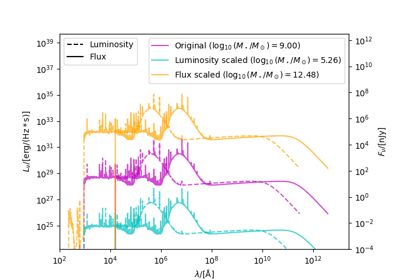
An example showing how to scale a galaxy’s mass by luminosity/flux.
- class synthesizer.emission_models.stellar.pacman_model.ScreenEmission(grid, tau_v, dust_curve, dust_emission=None, label=None, **kwargs)[source]¶
The ScreenEmission model.
This emission model is a simple dust screen model, where the dust is assumed to be in a screen in front of the stars. The dust curve and emission model can be specified, but the escape fraction is always zero.
This model is a simplified version of the PacmanEmission model, so in reality is just a wrapper around that model. The only difference is that fesc and fesc_ly_alpha are zero by definition.
- grid¶
The grid object.
- Type:
- tau_v¶
The V-band optical depth.
- Type:
float
- dust_curve¶
The dust curve.
- Type:
synthesizer.dust.DustCurve
- dust_emission¶
The dust emission model.
- Type:
synthesizer.dust.EmissionModel
